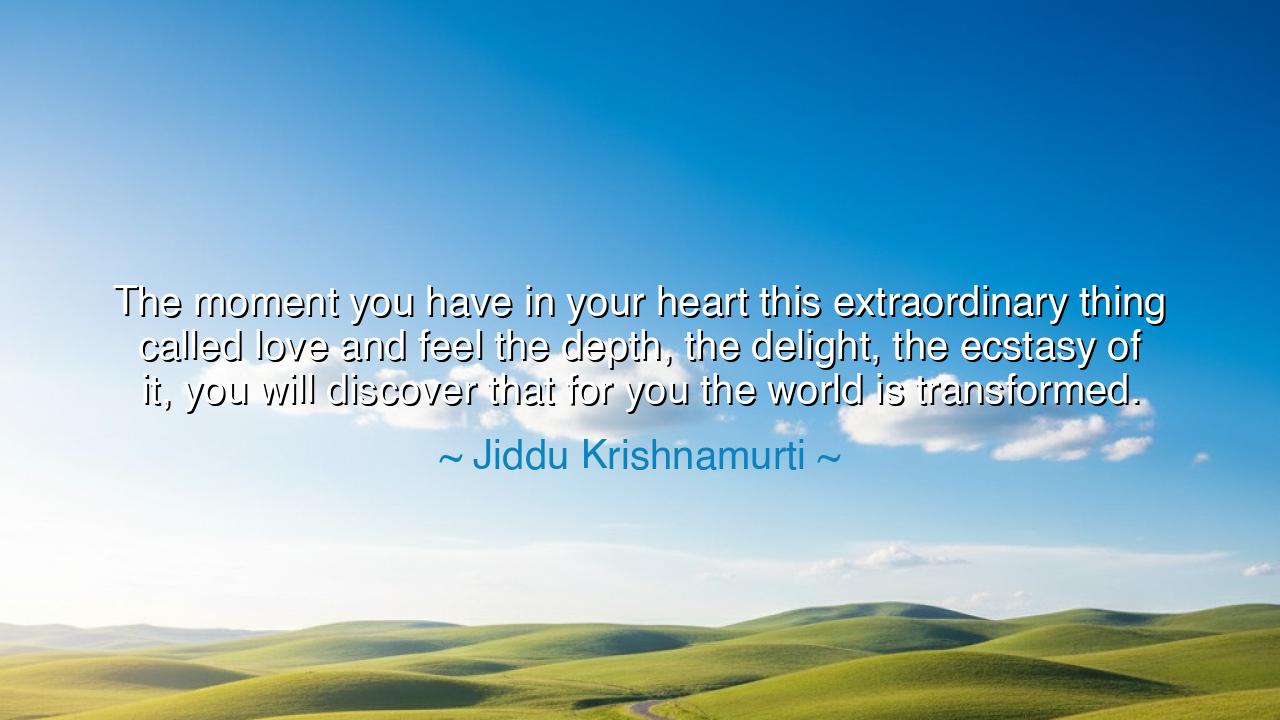
The moment you have in your heart this extraordinary thing called
The moment you have in your heart this extraordinary thing called love and feel the depth, the delight, the ecstasy of it, you will discover that for you the world is transformed.






When Jiddu Krishnamurti said, “The moment you have in your heart this extraordinary thing called love and feel the depth, the delight, the ecstasy of it, you will discover that for you the world is transformed,” he was not speaking of the fleeting emotion that often passes for love — but of the pure consciousness of love itself. Krishnamurti, the philosopher who sought freedom from all systems and dogmas, believed that love is not a sentiment to be possessed, but a state of being. It is the flame that burns away fear, division, and sorrow. When this love awakens in the heart, everything changes — not because the world itself changes, but because one’s vision becomes clear. The eyes of love see differently; they no longer judge, divide, or cling — they simply behold.
Krishnamurti’s teaching emerged from his lifelong quest to understand truth untainted by religion, politics, or authority. For him, love was not an ideal to be achieved, but a natural force obscured by the ego’s constant noise. When the mind grows still, when thought and self-interest fade, love arises effortlessly, like sunlight breaking through clouds. And in that moment, perception itself is transformed. The same sky, the same people, the same world — all are seen anew, radiant with significance. The transformation is not external, but internal, and yet its power reshapes how one lives, acts, and relates to all existence.
The depth and delight Krishnamurti speaks of are not pleasures that fade, but the living ecstasy of unity. Love, when truly felt, dissolves the barrier between self and other. One no longer stands apart from life but within it. The lover and the beloved, the observer and the observed, become one. In that union lies the extraordinary transformation he describes. For in love, there is no fear of loss, no desire to possess. There is only participation — a joyous surrender to being alive. This is why Krishnamurti called love the highest form of intelligence: it is awareness without separation, the understanding that life is whole.
History offers examples of souls who lived in such transformation. Consider Mahatma Gandhi, whose love extended even to those who struck him. He once said, “If we could change ourselves, the tendencies in the world would also change.” His life proved that love born of inner freedom has the power to remake nations. Or think of Saint Francis of Assisi, who looked upon every creature — bird, beggar, and beast alike — and called them brother or sister. Such people were not naïve; they had seen suffering and still chose love. Their vision was transformed, and through that vision, they transformed the world.
Yet this love cannot be taught through doctrine, nor forced through will. It must be discovered — felt in stillness, lived through awareness. Krishnamurti warns that most people seek love through attachment, desire, or dependency, and thus they bind themselves to conflict. True love, he says, has no opposite; it does not arise from the need to be loved, but from the fullness of being. When the heart is free — unafraid, unjudging, undivided — love flows naturally, and in that flow, the world becomes luminous. Where once there was struggle, there is now understanding; where once there was sorrow, there is compassion.
To live by this truth requires practice — not in ritual, but in mindfulness. Each day, strive to see with love. When you look upon another person, ask not what they can give, but what you can understand. When anger rises, meet it not with denial, but with clarity and compassion. When loneliness appears, do not flee it, but embrace it as part of the human song. Gradually, this awareness deepens until love ceases to be an emotion and becomes your natural state — a presence that colors every thought and act. This is the adventure of awakening, the quiet miracle of transformation.
So, my child, remember this eternal teaching: love is not something to seek — it is something to see. Let your heart be still enough to feel it, and your eyes clear enough to perceive it in all things. For as Jiddu Krishnamurti revealed, “The moment you have in your heart this extraordinary thing called love… you will discover that for you the world is transformed.” The trees will seem more alive, the faces of strangers more luminous, and even sorrow will shimmer with meaning. For love does not change the world by force — it changes the one who loves, and through that transformation, all things are made new.






AAdministratorAdministrator
Welcome, honored guests. Please leave a comment, we will respond soon